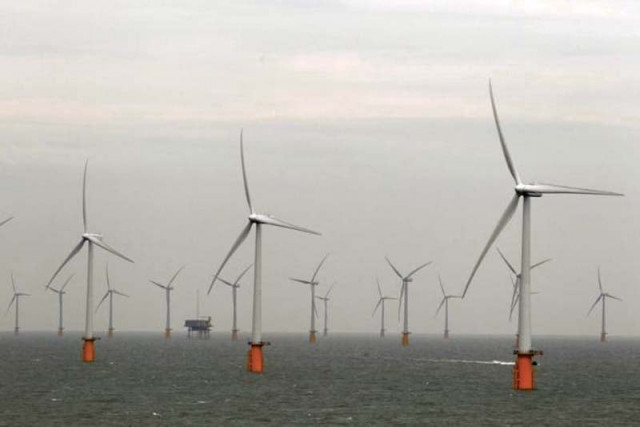Taking a new line: Focusing on LNG, govt bans new solar and wind projects
Admits they are expensive compared to conventional energy sources.

200MW is the capacity of three wind power projects initiated with the cooperation of China. PHOTO: REUTERS
As the focus rapidly shifts towards liquefied natural gas (LNG)-based power plants, the government has slapped a ban on new solar and wind energy projects, saying they are unfeasible because of being expensive compared to conventional electricity production projects.
The decision was taken in a meeting of the cabinet committee on energy on April 8. The government has admitted for the first time that these renewable energy sources were expensive compared to the conventional means.
Among the various sources of energy, hydroelectric power has the highest share of 34% in total electricity production, followed by furnace oil-based power generation that contributes 33%, gas 21%, diesel 1.8%, wind energy 0.63% and coal 0.31%.

Already three wind power projects with a combined generation capacity of 200 megawatts have been initiated in cooperation with China under the China-Pakistan Economic Corridor and one solar project of 900MW capacity. Apart from this, work is continuing on a 950MW solar plant.
The Ministry of Water and Power told the energy committee that power generation through solar and wind plants would be pricey because of their high tariffs compared to conventional energy projects. Therefore, no new solar and wind projects should be proposed and sponsored until a further decision on the issue, it suggested.
Following the deliberations, the energy committee, chaired by Prime Minister Nawaz Sharif, agreed that no new solar and wind power projects would be proposed and sponsored by the time a further decision was taken on the issue.
The committee also discussed in detail the use of LNG in power plants. Officials stressed that there was a dire need for improving the gas supply network in order to clear the way for LNG supply to planned 3,600MW power projects in Punjab.
They emphasised the need for establishing a capacity payment mechanism to make it abundantly clear who would make such payments in the absence of gas supply.
Water and power secretary briefed the meeting about the progress on building LNG-fuelled power plants.
The National Engineering Services of Pakistan (Nespak) has been engaged for preparing the project cycle (PC-1) for the proposed schemes. Preliminary studies for the selected sites have been completed and the Punjab government has been requested to facilitate the land acquisition efforts.
The water and power secretary also spoke about short- and medium-term measures aimed at energy conservation. In the short term, energy will be saved through enforcement of energy discipline in government offices, a public awareness campaign, daylight saving and enforcement of commercial operation timings.
It was proposed that strict energy-saving measures should be undertaken in offices of the federal and provincial governments to economise the consumption of electricity.
Published in The Express Tribune, April 22nd, 2015.
Like Business on Facebook, follow @TribuneBiz on Twitter to stay informed and join in the conversation.


















COMMENTS
Comments are moderated and generally will be posted if they are on-topic and not abusive.
For more information, please see our Comments FAQ